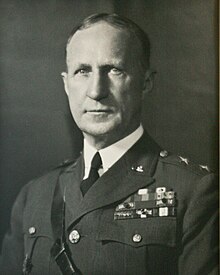George Van Horn Moseley
| George Van Horn Moseley | |
|---|---|

MG George Van Horn Moseley
|
|
| Born |
September 28, 1874 Evanston, Illinois |
| Died | November 7, 1960 (aged 86) Fulton County, Georgia |
| Allegiance |
|
| Service/branch |
|
| Years of service | 1899–1938 |
| Rank |
|
| Commands held |
Third United States Army 1st Cavalry Division |
| Battles/wars |
Spanish–American War Pancho Villa Expedition World War I |
| Awards |
Distinguished Service Medal (2) Legion of Honor Croix de guerre Order of the Bath Belgian Order of the Crown Order of the Crown of Italy |
George Van Horn Moseley (September 28, 1874 – November 7, 1960) was a United States Army general. Following his retirement in 1938, he became controversial for his fiercely anti-immigrant and antisemitic views.
Moseley was born in Evanston, Illinois, on September 28, 1874. He graduated from the United States Military Academy in 1899 and was commissioned second lieutenant in the cavalry. He served in the Philippines twice, from 1900 to 1903 and 1906 to 1907, where his assignments included commanding a troop of the 1st Cavalry and serving as Aide-de-Camp to Generals J. M. Bell and J. M. Lee. In 1901 Moseley, accompanied by only one other officer, without escort and under conditions of great danger, penetrated a major Philippine insurgent stronghold. 2nd Lt. Moseley and 1st Lt. George Curry convinced Brigadier General Ludovico Arejola to sign the peace agreement in Taban, Minalabac (Philippines) on 25 March 1901.
The honor graduate of the Army School of the Line in 1908, he also graduated from the Army Staff College in 1909 and the Army War College in 1911. During World War I, Moseley served as assistant chief of staff for logistics (G-4) on the staff of the American Expeditionary Force headquarters.
Moseley married Mrs. Florence DuBois in July 1930.
He held camp and Washington assignments from 1920–1929. He was a member of several important commissions, including the Harbord Commission to investigate Armenian issues. After commanding the Second Field Artillery Brigade, in 1921 he was detailed as assistant to General Dawes in organizing the newly created Bureau of the Budget. In 1921 he was promoted brigadier general, Regular Army. Commanding the 1st Cavalry Division (1927–1929), he successfully interceded, under fire, with principals in a 1929 Mexican insurrection. His actions stopped stray gunfire from Juarez, Mexico, from endangering life and property in adjacent El Paso, Texas, and precluded further incidents. In 1931 he was promoted major general, Regular Army.
...
Wikipedia
